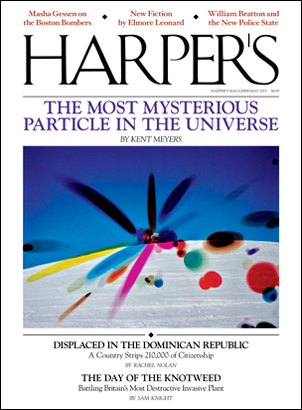Introducing the May Issue
Petra Bartosiewicz investigates William Bratton’s data-driven policing tactics, Kent Meyers follows particle physicists on their quest for dark matter, and more
 Our May cover story begins in Deadwood, South Dakota, the once-lawless town where Wild Bill Hickok met his untimely end in 1876. But the heroes of Kent Meyers’s essay aren’t outlaws; they’re scientists—and the frontier they’re exploring can’t be found on any map. Just south of Deadwood is the shuttered Homestake Gold Mine, whose 370 miles of horizontal tunnel now house the Stanford Underground Research Facility where physicists are hunting an elusive subatomic particle known as the neutrino. “One hundred trillion [neutrinos] pass through each of us every second,” Meyers reports, but little is known about them or how they fit into our Standard Model of particle physics. Accommodating the neutrino, he writes, “might in fact require an entirely new system.”
Our May cover story begins in Deadwood, South Dakota, the once-lawless town where Wild Bill Hickok met his untimely end in 1876. But the heroes of Kent Meyers’s essay aren’t outlaws; they’re scientists—and the frontier they’re exploring can’t be found on any map. Just south of Deadwood is the shuttered Homestake Gold Mine, whose 370 miles of horizontal tunnel now house the Stanford Underground Research Facility where physicists are hunting an elusive subatomic particle known as the neutrino. “One hundred trillion [neutrinos] pass through each of us every second,” Meyers reports, but little is known about them or how they fit into our Standard Model of particle physics. Accommodating the neutrino, he writes, “might in fact require an entirely new system.”
In a 2013 decision that came to be known simply as “the Sentence,” the Dominican Republic’s highest court declared that all Dominicans born to undocumented foreign parents after 1929 were not citizens. The result of the ruling, which was aimed at deporting residents of Haitian descent, was devastating: 210,000 children of immigrants were suddenly stateless. In this month’s Letter from the Dominican Republic, Rachel Nolan documents life for these afectados and explains the bizarrely complicated path to naturalization the government has created—a plan that, according to one NGO director interviewed by Nolan, is a “Kafka-Orwellian jamboree.”
In her report on New York City Police Commissioner William Bratton, Petra Bartosiewicz argues that during his previous job as chief of the Los Angeles Police Department, Bratton transformed the city into the “most spied-on” in America. He’s championed the use of data-driven, intelligence-led policing that deploys cell phone–tracking towers, license-plate readers, facial-recognition software, GPS trackers, and a slew of other technologies to collect information on citizens. While in Los Angeles, Bratton used data to, as Bartosiewicz describes it, “anticipate where future criminal activity was likely to occur.” How will these tactics play out now that he’s back in New York? Bratton, for his part, doesn’t seem worried that these increasingly sophisticated surveillance techniques will invade citizens’ privacy. “I don’t think the public is too concerned with us using technology to prevent a crime,” he told Bartosiewicz. “People don’t get upset when doctors use technology to prevent Alzheimer’s or cancer.”
Last May, Abe Streep’s violin was stolen in Portland, Oregon. The Czech fiddle, made in the middle of the nineteenth century, was valued at about seven thousand dollars. But to Streep, who’d owned the instrument since high school, it was worth far more. “To lose an instrument is to lose an essential piece of one’s identity,” he writes. “It brings its own solitary form of grief.” Streep’s memoir is both an account of his dogged search for the violin through pawnshops and police departments, and a tender reminiscence of his time with an instrument he knew was, in his words, “too fine for me.”
Our May Readings includes an excerpt from Masha Gessen’s new book, The Brothers, which follows the FBI’s hunt for the Boston Marathon bombers Tamerlan and Dzhokhar Tzarnaev; a selection from Elena Ferrante’s first in-person interview; and complaints from a class-action lawsuit filed in February against the city of Ferguson, Missouri, for excessively fining and imprisoning residents for minor infractions. (“[Allison] Nelson has been jailed on two occasions by the city because she has not been able to pay fines and costs from traffic tickets,” the suit reads. “Because of the threat of jail and constant cycle of increasing debts to the city of Ferguson, Nelson has been afraid to leave her home or even to get into a car as a passenger.”)
Also in this issue: Sam Knight on Japanese knotweed, an invasive plant species pervasive throughout Britain and sometimes described as “the largest female organism on the planet”; Terry Castle on musician Robin Williamson’s sprightly second act; and Ruth Franklin on Saul Bellow and the biographer’s desire to “reach for the brass ring.”



